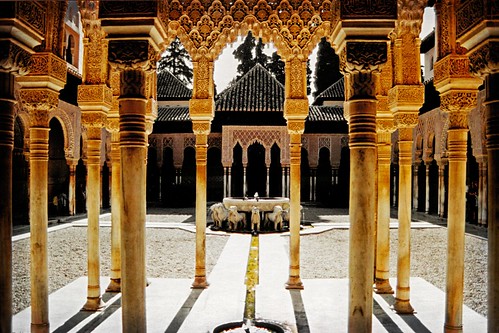
Awesome . . . via Open Culture. The picture above is one of many beautiful perspectives at the Alhambra.
Andrés Segovia, Father of Classical Guitar, at the Alhambra
Andrés Segovia first visited the Alhambra, the storied 14th Century Moorish palace in Granada, Spain, when he was ten years old. “It was here,” he said, “that I opened my eyes to the beauty of nature and art. To be here is to feel oneself to be near, very near, paradise.”
Segovia is often called the father of classical guitar. As a young boy he learned to play flamenco, the traditional music of his native Andalusia, but by the time he was a teenager he was transcribing Bach and other composers, adapting music originally intended for different instruments. Over the course of his lifetime, Segovia transcribed much of the classical repertoire, refined the standard technique, and established the guitar as a serious instrument, bringing it out of the parlors and into the concert halls.
In 1976, at the age of 84, Segovia returned to the Alhambra to perform for the documentary, Andrés Segovia: The Song of the Guitar. In the excerpt above, Segovia plays one of his favorite pieces, “The Legend of Asturias,” by Isaac Albéniz, who composed it for the piano as a prelude to his “Cantos de España.” The complete documentary is available on a two-film DVD, Andrés Segovia: In Portrait.
Tags:
No comments:
Post a Comment